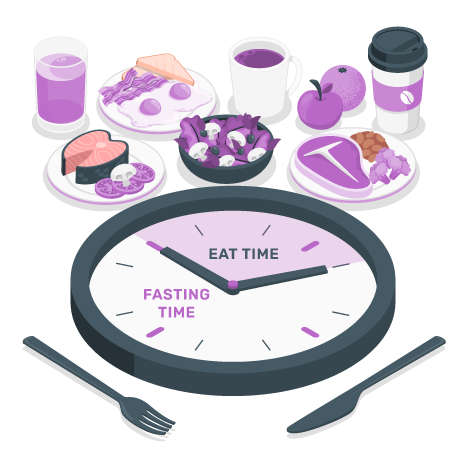Use our free Intermittent Fasting Calculator to find your ideal fasting and eating window based on your age, body stats, activity level, and preferred fasting method. This calculator removes guesswork and helps you follow intermittent fasting safely, consistently, and effectively.
Whether you’re starting with 16:8, experimenting with 18:6, or following 5:2, this tool gives you exact fasting and eating times tailored to your lifestyle.
Intermittent fasting (IF) is an eating pattern that cycles between periods of eating and fasting. Instead of focusing on what foods to eat, it emphasizes when you eat.
During fasting hours, calorie intake is minimal or zero, allowing your body to shift from using glucose to burning stored fat for energy. When done correctly, intermittent fasting can support weight management, metabolic health, and better eating habits.
Our calculator personalizes your fasting schedule using:
Based on these inputs, the calculator instantly shows:
This helps you stay consistent and avoid common fasting mistakes like overeating or irregular schedules.

The 16:8 method involves fasting for 16 hours and eating within an 8-hour window. It’s the most beginner-friendly and sustainable fasting approach.
Many people following 16:8 rely on simple, protein-rich foods like eggs. Understanding the calories in an egg helps keep meals balanced without exceeding energy needs.
This method extends fasting to 18 hours with a 6-hour eating window. It may accelerate fat loss but requires careful meal planning and adequate nutrition.
The 20:4 approach involves one main meal per day. It’s more advanced and best suited for experienced fasters who already understand their nutritional requirements.
With the 5:2 method, you eat normally for five days and significantly reduce calories on two non-consecutive days. This approach offers flexibility without daily fasting.
When practiced correctly, intermittent fasting may help:
Pair intermittent fasting with awareness of your daily calorie needs to avoid overeating during your eating window and to maintain long-term results.
Below is a realistic sample diet plan for someone following the 16:8 fasting method. This is only an example and can be adjusted based on dietary preferences.
12:00 PM – First Meal (Break Fast)
4:00 PM – Light Snack
7:30 PM – Dinner
Egg-based meals are popular in fasting diets due to their protein density and controlled calories in 3 eggs, making them ideal for breaking a fast.
During fasting hours, you can safely consume:
Avoid sweetened drinks, juices, or milk-based beverages as they break the fast.
Intermittent fasting is not suitable for everyone. Extra caution is advised for:
Women with PCOS: Fasting may benefit some, but it should be approached carefully. Learn more about intermittent fasting for PCOS weight loss before starting.
Using a calculator helps eliminate these mistakes by providing structured timing and consistency.
For healthy adults, intermittent fasting is generally safe when done correctly. Always consult a healthcare professional if you have a medical condition.
Most people notice changes in energy and appetite within 1–2 weeks, while weight-related results may take longer.
Yes, light to moderate workouts are usually safe during fasting. Intense training may require adjustments.
Our calculator helps you plan fasting windows accurately, avoid common mistakes, and stay consistent.
👉 Use the Intermittent Fasting Calculator above to get your personalized fasting and eating schedule today.
TThis content is for informational purposes only and does not replace professional medical advice. Always consult a qualified healthcare provider before making dietary or lifestyle changes.
